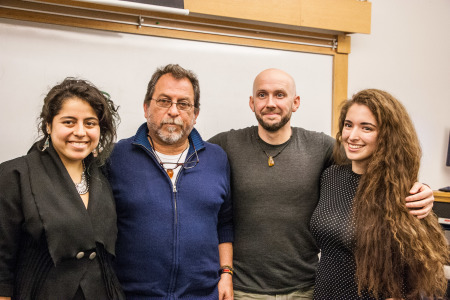On Wednesday, Nov. 12, Enrique Reynoso, one of the organizers of the Frente Popular Francisco Villa Independiente, or “Los Panchos,” spoke to a packed room of students, professors and community members in ARH 305 about the right to housing as a basic human right.
Reynoso explained the history of Los Panchos’ fight for dignified housing and living in Mexico City while Tony Nelson of the Chicago-based Mexican Solidarity Network, who sponsored this event with Grinnell’s Student Organization of Latinos and Latinas, translated Reynoso’s talk into English. Reynoso told students that prior to this speaking tour, no one from Los Panchos had ever traveled to the United States to speak about the movement.
“We didn’t believe there was a sensitivity to understand the problems we were having [among American students],” Reynoso said. “Fortunately, we were mistaken. We have seen sensitivity as well as a great concern.”

Photo by Sydney Steinle.
However, attendee Rosie O’Brien ’16 said that Americans can still strive beyond sensitivity if they hope to affect real change.
“Usually, Americans have a different conception of what struggle really is, so we tend to think that ‘service work’ is about mutual benefits, but if we really want to help solidarity movements, we need to simply listen and help where needed,” she wrote in an email to The S&B.
Reynoso listed a number of the many social problems that currently exist in Mexico City, such as a lack of employment and systemic poverty.
“There is unemployment, everyday [there is] a system of education that is more and more inefficient,” he said. “It is evident that the Mexican state has designed education programs that basically ensure cheap manual labor.”
Reynoso then addressed specifically the issue of housing inequality in Mexico City, one of Los Panchos’ main concerns.
“There is less and less land to build houses on each day,” Reynoso said. “These lands are turned over to private investors, and in this way, there are zones that are very expensive and this means that many of the workers have to live in the periphery of the city, without much probability of them ever having their own house.”
Reynoso explained that the Mexican Constitution states that every citizen has the right to dignified housing. “We got tired of waiting for the state to comply with this obligation,” Reynoso said. “We have decided to make this constitution a reality, even if this takes going against the government themselves.”
Reynoso described how the quality and size of housing one receives from the Mexican government depends on their economic ability.
“For us, in our economic situations, we were qualified for 42 cubic meter houses. But with community work, we achieved housing that was 65 by 66 cubic meters,” Reynoso said. “After that, we demanded that people would only pay what they actually could pay. [Members of Los Panchos] pay 600 pesos per month, or $50. This is what they pay, depending on the economic ability of each person.”
Los Panchos worked together not only to construct houses, but also to build a multi-use recreation area, a “plaza for socialist revolution,” and a greenhouse, all of which is part of their closed off and gated community. Additionally, Reynoso explained how the fight for dignified housing was not an easy one.
“We had confrontations with the police. Our compañeros and compañeras learned how to do sutures, to be able to fix our wounded,” Reynoso said.
Nelson emphasized that Los Panchos are fighting for much more than housing rights in Mexico City. “Many people have created housing, and then [the movements] just end!” Nelson said. “With the Panchos, they realized that they had housing but they didn’t want to stop. They are not just a movement of housing, they are a movement of a dignified life.”
Reynoso detailed some of the aspects of a dignified life that Los Panchos implemented in their community, including aspects of urban agriculture like a greenhouse that produces natural medicines. Reynoso hopes that this visibility of agriculture will help address the disconnection between many youths and their land and means of production.
“I don’t know if this happens here, but the kids [in Mexico City] believe vegetables grow in a supermarket,” he said with a laugh.
Although Los Panchos has achieved many of its goals as a movement, the fight is nowhere close to over. Reynoso mentioned that its next goal is to have a functional clinic that is locally accessible.
When asked by audience members about how Los Panchos have succeeded in the face of an uncooperative government, Reynoso cited the power of collective action to create change.
“We had little successes and we were able to sustain the land. After that, even though it sounds a little romantic, we dared ourselves to dream,” Reynoso said. “This dream allowed us to continue working and continue walking. The majority of things are done by community work. When we find a common objective, we can advance!”
Students had a chance to mingle with Reynoso and Nelson after the event, and many found the talk illuminating and informative.
“I am interested in organizing myself, so it’s really cool to actually meet some people involved,” said attendee Eli Shepherd ’18.



















































